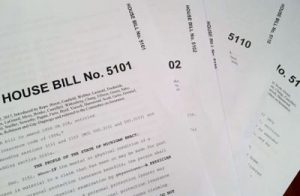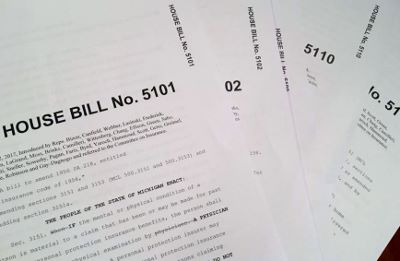 The Fair and Affordable No-Fault Reform Package — House Bills 5101-5111 — has been formally introduced in the state Legislature. The measure offers long-lasting Michigan no-fault reform.
The Fair and Affordable No-Fault Reform Package — House Bills 5101-5111 — has been formally introduced in the state Legislature. The measure offers long-lasting Michigan no-fault reform.
The Fair and Affordable No-Fault Reform Package is among the most comprehensive Michigan no-fault reform measures to be introduced in the past decade.
The package is a clear alternative to House Bill 5013, which was defeated in the Michigan House on November 2, 2017. The measure was pushed by Detroit Mayor Mike Duggan, House Speaker Tom Leonard, Rep. Lana Theis and the insurance industry. Contrary to what was touted by proponents of House Bill 5013, the proposal did not guarantee lower auto insurance rates and, instead, would have destroyed Michigan’s no-fault system as we know it.
The Fair And Affordable Michigan No-Fault Reform Package
House Bills 5101-5111 would do the following:
- Ban non-driving rating factors that are currently being used by insurance companies to set rates, such as credit score, gender, occupation and education level.
- Implement a fee schedule at 185% of workers’ compensation for all medical providers treating auto accident victims, with cost-of-living adjustments. Level 1 and 2 trauma centers would not be subject to the fee schedule. The proposal will also streamline the claims process, improve fairness, reduce costs and improve efficiency by requiring electronic billing between providers and insurance companies.
- Establish a $15 per hour rate schedule for family-provided attendant care, with allowable waivers to ensure fair compensation for certain patients whose disabilities and needs justify more skilled care. The bill also ensures patients who require 24/7 care will have access to it.
- Create fair standards and qualifications regulating physicians who conduct independent medical exams when requested by insurance companies.
- Strengthen an existing law requiring that auto insurance premiums are “appropriately reduced” for any consumer who buys a coordinated no-fault policy.
- Fix several Michigan appellate court decisions that have had a detrimental impact on car crash victims and the medical providers that treat them:
- Mitigate the unfairness of the Admire v Auto Owners decision, which has been used by insurance companies to deny paying legitimate expenses needed by accident victims with catastrophic injuries, including handicap accessible transportation and barrier free accommodations.
- Mitigate the unfairness of the decision in Bahri v IDS Property Casualty Ins Co, which allows insurance companies to void an entire policy for any claims containing errors that the insurance companies allege are fraudulent.
- Re-instate the “innocent third-party rule,” which was overturned in Bazzi v Sentinel Ins Co, thereby protecting third-party claimants who did not participate in fraudulent procurement of a policy.
In addition, several other proposals also make up the Fair and Affordable No-Fault Reform package:
- A proposal to allow senior citizens to lower their rates by ensuring Medicare and auto insurance are not providing duplicate coverage for an accident.
- A proposal to resolve issues created by the Michigan Supreme Court ruling in Covenant Medical Center v State Farm, by restoring the right of medical providers to sue auto insurance companies that fail to pay for a patient’s care and related expenses.
- House Bill 4672, which creates a fraud authority designed help lower rates by cracking down on auto insurance fraud.
- House Bill 4049, which seeks to bring more transparency to the insurance system by requiring the Michigan Catastrophic Claims Association to disclose the actuarial calculations it uses to set the annual fee charged to every insured vehicle in the state (currently $170 per vehicle), as part of motorists’ insurance premiums.
Fair And Affordable Michigan No-Fault Reform: A Lasting Change
George T. Sinas, Stephen H. Sinas and Thomas G. Sinas are the legal team for the Coalition Protecting Auto No-Fault (CPAN), which supports the Fair and Affordable No-Fault Reform Package. The CPAN legal team issued a thorough analysis of House Bill 5013, the alternative no-fault proposal that was offered and which recently failed to pass the Michigan House.
In its analysis, the CPAN legal team concluded that House Bill 5013 would have been “the end of no-fault as we know it” because:
- it would have shattered the current availability of lifetime medical care and would “result in a severe loss of benefits for thousands of Michigan auto accident victims.”
- it gave “unprecedented control to government bureaucracy and insurance companies to determine and control the type of medical care and services that injured persons will receive under the No-Fault Act.”
- it gave “more power” to insurance companies while taking away the legal rights of Michigan auto accident victims.
In this video segment, Stephen Sinas talks about the legislative efforts to reform Michigan’s no-fault insurance system.
Stay with Sinas Dramis and the Auto No-Fault Blog as no-fault reform measures continue to make their way through the Michigan Legislature.

